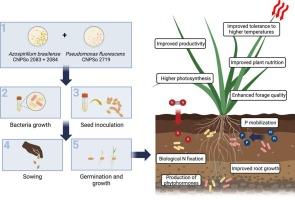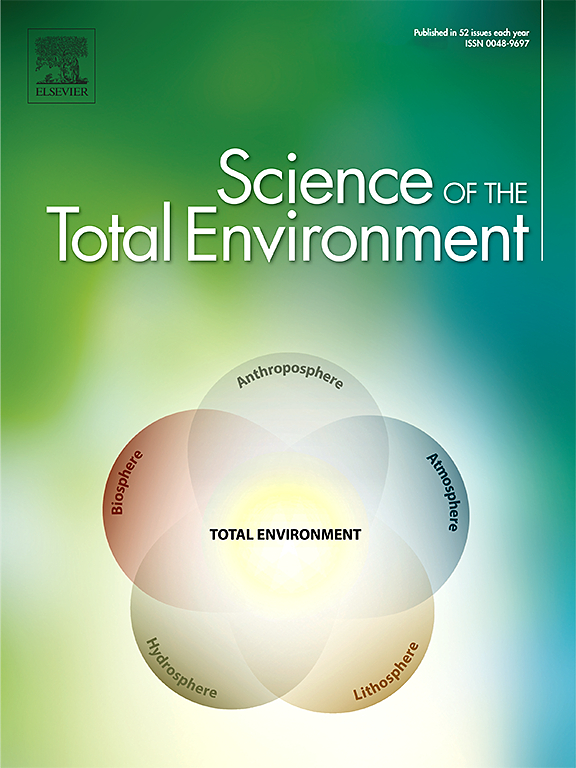接种植物促生菌减轻了2°C升温对热带C4草地光合作用、生长和营养价值的负面影响
IF 8
1区 环境科学与生态学
Q1 ENVIRONMENTAL SCIENCES
引用次数: 0
摘要
人为引起的气候变化正在导致地球温度上升,模型显示未来几年气温还会持续上升。温度是调节自然生态系统和人工管理生态系统碳通量的重要因素之一。近几十年来,在C4禾草中使用植物促生菌已成为缓解非生物因子对植物代谢、生长和饲料营养品质负面影响的重要替代方法。本研究研究了增温(+2℃)对接种或未接种巴西偶氮螺旋菌和荧光假单胞菌的马富诺Brachiaria(同称Urochloa)马富诺Brachiaria(同称Brachiaria Mavuno)放牧草地光合作用、植物水分状况、生长和营养品质的影响。我们在多因子设计中评估了两种接种水平(接种和未接种)下的两种温度水平(环境温度和升高温度)。我们的研究结果表明,通过提高气孔导度和改善光系统II性能,接种刺激了根系生长,提高了光合速率,可能导致生产力提高,粗蛋白质含量和饲料消化率降低,木质素和纤维含量降低。增温提高了旱季非光化学猝灭速率和电子传递速率,降低了旱季PSII光化学正午最大量子效率、相对含水量、生产力、饲料品质和消化率。当接种植株在较温暖的大气环境下发育时,接种的正面效应完全抵消了升温对光合作用、生长、营养品质和消化率的负面影响,导致牧草木质素含量降低,热耗散能力和消化率提高。结果表明,巴西芽孢杆菌与荧光假单孢菌共接种是一种可持续的选择,可以充分缓解气温升高对马武诺草地的负面影响。这些发现强调了微生物接种剂在气候胁迫下提高牧草恢复力和生产力的潜力。本文章由计算机程序翻译,如有差异,请以英文原文为准。

Inoculation with plant growth-promoting bacteria mitigates the negative impacts of 2 °C warming on the photosynthesis, growth, and nutritional value of a tropical C4 grassland under field conditions
Human-induced climate change is causing Earth's temperature to rise, and models indicate a persistent increase in the next years. Temperature is one of the most important factors regulating the carbon flux of natural and managed ecosystems. In the last decades, the use of plant growth-promoting bacteria in C4 grasses has emerged as an important alternative to alleviate the negative impacts of abiotic factors on plant metabolism, growth, and forage nutritional quality. In this study, we investigated the effects of warming (+2 °C) on the photosynthesis, plant water status, growth, and nutritional quality of a managed pasture of Brachiaria (syn. Urochloa) Mavuno inoculated or not with Azospirillum brasilense and Pseudomonas fluorescens. We evaluated two levels of temperature (ambient and elevated) under two levels of inoculation (inoculated and non-inoculated) in a multifactorial design. Our results showed that inoculation stimulated root growth and increased photosynthetic rates through higher stomatal conductance and improved photosystem II performance, presumably resulting in higher productivity, crude protein content, and forage digestibility with reduced lignin and fiber fraction. Warming increased non-photochemical quenching and electron transport rate in the wet season, but decreased midday maximum quantum efficiency of PSII photochemistry during dry season, relative water content, productivity, and forage quality and digestibility. When inoculated plants developed under a warmer atmosphere, the positive effects of inoculation completely counteract the negative impacts of warming on photosynthesis, growth, nutritional quality, and digestibility, resulting in a pasture with reduced lignin content and improved heating dissipating capacity and digestibility. Our results demonstrated that A. brasilense and P. fluorescens co-inoculation is a sustainable option to fully mitigate the negative impacts of elevated temperature on Mavuno grass pastures. These findings highlight the potential of microbial inoculants in enhancing forage resilience and productivity under climate stress.
求助全文
通过发布文献求助,成功后即可免费获取论文全文。
去求助
来源期刊

Science of the Total Environment
环境科学-环境科学
CiteScore
17.60
自引率
10.20%
发文量
8726
审稿时长
2.4 months
期刊介绍:
The Science of the Total Environment is an international journal dedicated to scientific research on the environment and its interaction with humanity. It covers a wide range of disciplines and seeks to publish innovative, hypothesis-driven, and impactful research that explores the entire environment, including the atmosphere, lithosphere, hydrosphere, biosphere, and anthroposphere.
The journal's updated Aims & Scope emphasizes the importance of interdisciplinary environmental research with broad impact. Priority is given to studies that advance fundamental understanding and explore the interconnectedness of multiple environmental spheres. Field studies are preferred, while laboratory experiments must demonstrate significant methodological advancements or mechanistic insights with direct relevance to the environment.
 求助内容:
求助内容: 应助结果提醒方式:
应助结果提醒方式:


